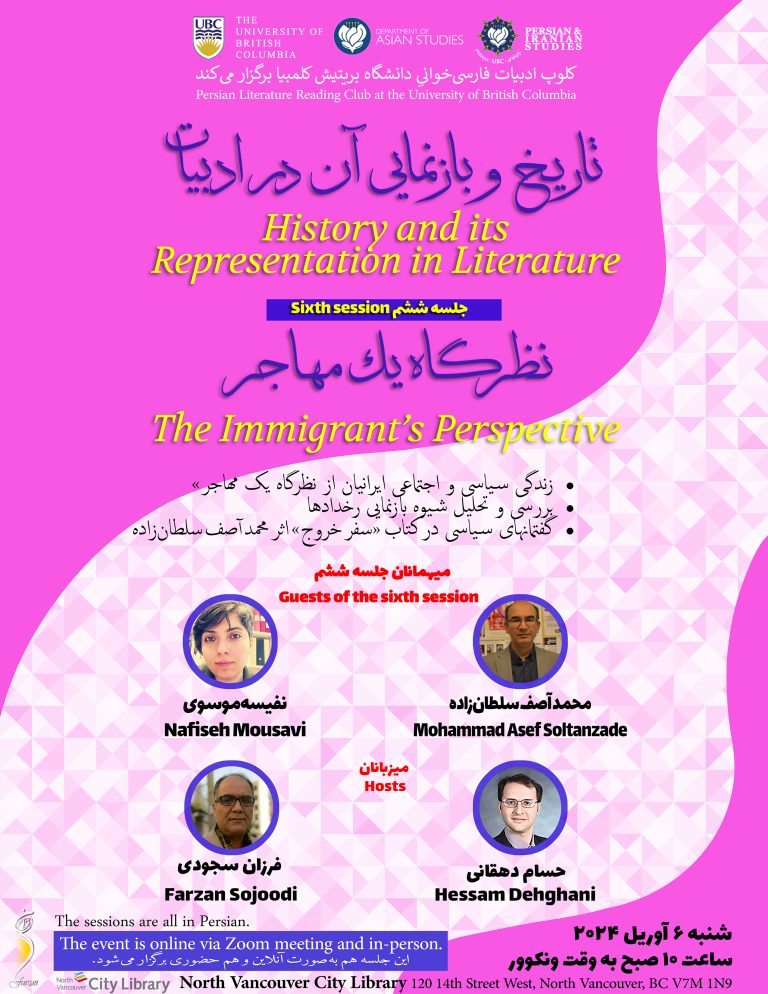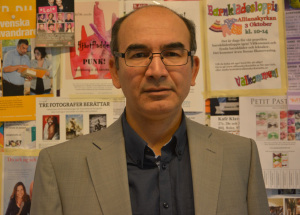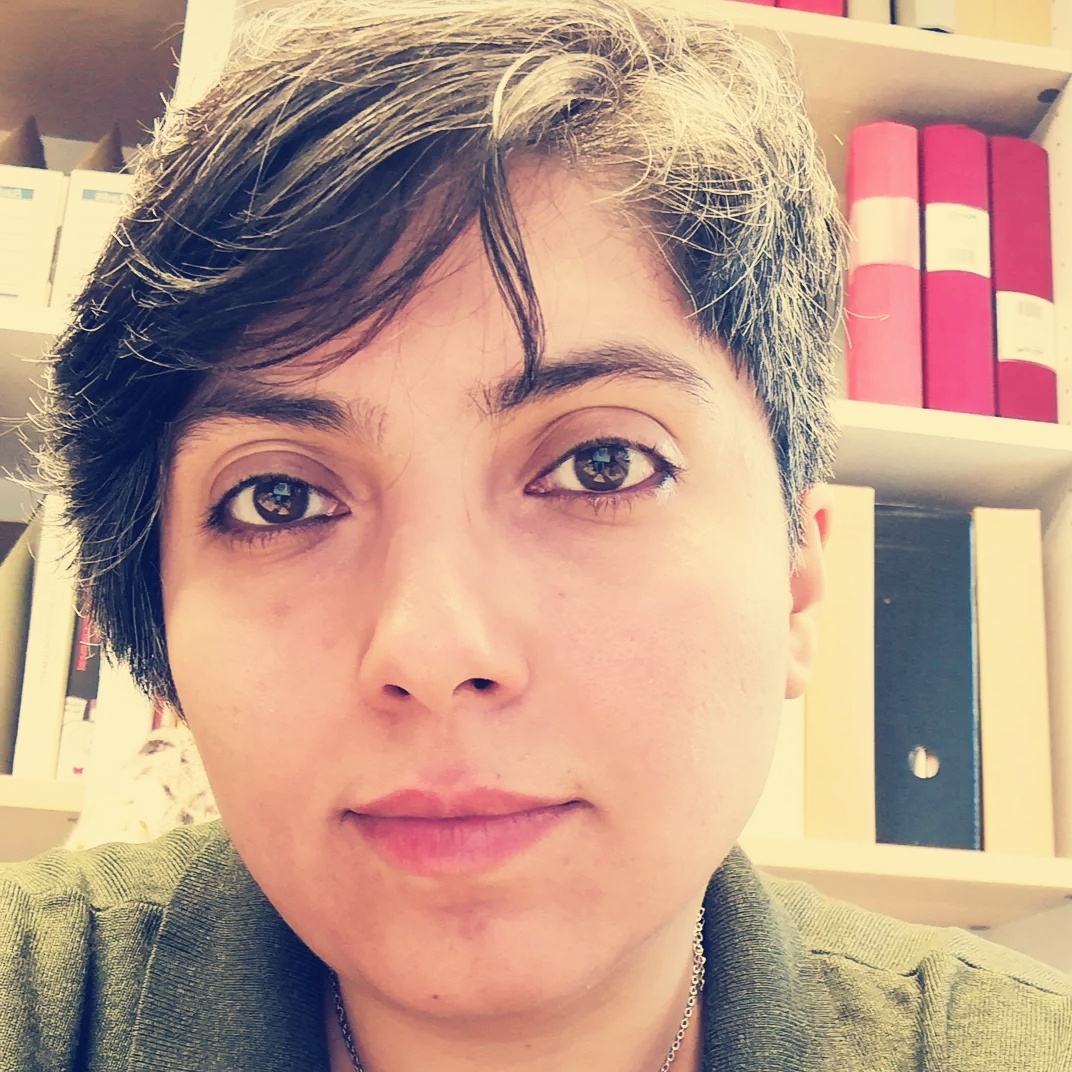

Blur image background of people in exhibition show
The sessions are all in Persian
Persian Literature Reading Club’s new panel discussion series in the year 2023-2024 will focus on:
History and its Representation in Literature
Introduction and Significance of the Topic:
Mohammad Ali Jamālzādeh, in the preface of his collection of stories “Once Upon a Time”, has regarded innovative approaches in literature, especially in short stories and novels, as a critique of the cultural, social, and political lives of people across the world.
About novels, for example, he states:
“For those who wish to be informed about the social, internal, and spiritual state of other nations and countries and want to convey and understand more about them than what is inadequately presented in history books, which only show the political and military aspects of a nation and its system and people, there is no better and more solid way than reading novels about that nation and people…”
Besides, since novels are created to engage the reader and evoke a sense of sympathy and identification with the characters and their world, they not only offer a form of representation of a society’s state but also place the reader within the experience of that world. Thus, novels can serve as a means of acquaintance or approaching the one who is most distant and “other”, allowing for the hearing of the other’s voice.
Literature provides the safest space for such encounters of a historical, cultural, political, and ethnic nature. Novels paradoxically reveal the shared and singular experiences of the writers and characters on an emotional and pre-logical level. Hence, novels can provide a space for acquaintance with the other and a platform or a space for a multiplicity of voices.
Given the foundational importance of novels and their relationship with the lived historical experience, this series of sessions will focus on the examination of some of the most prominent and best novels published in the past forty-plus years. The aim is to delve into and shed some light on the historical experiences and events after the 1979 revolution up to present. In other words, these sessions will examine the representation of the conditions leading to the revolution, post-revolution events such as wars, and more, up to nearly the present time, within some of the most significant novels of this period.
برنامه جلسات باشگاه ادبیات فارسی خوانی در سال ۲۰۲۳-۲۰۲۴
:عنوان
تاریخ و بازنمایی آن در ادبیات
:مقدمه و اهمیت موضوع
محمدعلی جمالزاده در دیباچه مجموعه داستان «یکی بود یکی نبود»، ادبیات و خصوصاً داستان کوتاه و رمان را شیوههای نوینی برای نقد و بررسی حیات فرهنگی، اجتماعی و سیاسی مردم در همه جای جهان قلمداد کرده است. وی در مورد رمان میگوید
برای کسانی که میخواهند از حال اجتماعی و داخلی و روحی سایر ملل و ممالک باخبر بوده و وقوفی به هم برسانند و نمیخواهند به خواندن کتابهای تاریخ که تنها حیات سیاسی و نظامی یک و ملک و ملتی را- آن هم به طور ناقص و غیر کافی- نشان میدهد قانع شوند، هیچ راهی بهتر و راسختر از خواندن رمانهای راجع به آن مملکت و ملت نیست
مسئله دیگر این است که از آنجا که رمان به هدف جذب خواننده و برانگیختن حس همذات پنداری و شفقت خواننده به رشته تحریر درآمده است نه تنها نوعی بازنمایی از حیات اجتماعی یک ملت ارائه میدهد، بلکه خواننده را در معرض تجربهی آن فضا نیز قرار میدهد. بدین ترتیب رمان میتواند محل آشنایی با دیگری و حتی آشتی با دیگری و دست کم شنیدن شنیدن صدای دیگری باشد. اساسا ادبیات امنترین محمل و محل چنین برخوردهایی با دیگری تاریخی، فرهنگی، سیاسی و قومیتی است. رمانها نه در گفتگو بلکه در سطح احساسی و پیشا منطقی افراد را بر سر یک تجربهی مشترک و در عین حال فردی مینشانند. بدین ترتیب رمان میتواند محل آشنایی با دیگری و بستر فضای چند صدایی و شنیدن صدای دیگری باشد
با توجه به این اهمیت بنیادین رمان و نسبت آن با تجربه زیستهی تاریخ، در این مجموعه نشستها به بررسی برخی ازمطرحترین و بهترین رمانهای منتشر شده در چهل و چند سال اخیر خواهیم پرداخت تا از دریچه آنها از تجربه تاریخی انسان پس از انقلاب ۵۷ خبر بگیریم و دست یازیم. به عبارت دیگر در این سلسله نشستها به بازنمایی شرایط وقوع انقلاب، وقایع پس از انقلاب مانند جنگ و غیره تا نزدیک به زمان حال در برخی از مهمترین رمانهای این دوره خواهیم پرداخت
همکاران ثابت: دکتر فرزان سجودی – دکتر حسام دهقانی
Sixth Session:
Session Title: “History and its Representation in Literature: The Immigrant’s Perspective”
Session Content:
- TBA
Date & Time:
Saturday, April 6, 2024
10:00am (PST) / 9:30pm (Tehran Time)
Location: North Vancouver Library
There is also an option to attend virtually via Zoom Meeting.
Presented in Persian
Free & open to the public. Registration is required via the form below.
Guest Speaker


His first collection of short stories, “We Disappear in Flight,” was published in 2000 in Iran and won the Golshiri Literary Award. This book, along with his subsequent works, which were later translated into several languages, delves into themes of identity, the pain and suffering of migrants. His characters often experience feelings of being “the other” in foreign lands, leading to a crisis of identity. Soltanzadeh employs narrative elements like uncertainty, multiple endings, and the blending of dreams and reality to vividly portray the experiences of migrants.
In 2002, Soltanzadeh immigrated to Denmark and continued writing, producing more works that were published in Iran. He is a three-time recipient of the Golshiri Award and has also won the Copenhagen Literary Prize. His collections of stories and novels offer fresh perspectives on the experiences of migration and identity.
محمدآصف سلطانزاده، نویسنده معاصر اهل افغانستان، در سال ۱۳۴۳ در کابل به دنیا آمد. او که در دانشگاه زادگاهش داروسازی خوانده بود، در اوج حملات شوروی به کشورش در سال ۱۳۶۴، به همراه برادرش از افغانستان گریخت و ابتدا به پاکستان و سپس به ایران وارد شد، جایی که ۱۷ سال زندگی کرد. در ایران، سلطانزاده به نوشتن داستانهای کوتاه پرداخت و در فیلمسازی نیز تجربه کسب کرد.
اولین مجموعه داستان او، “در گریز گم میشویم”، در سال ۱۳۷۹ منتشر شد و برنده جایزه ادبی گلشیری شد. این کتاب و دیگر آثار او، که بعدها به چندین زبان ترجمه شدند، به موضوع هویت، رنج و درد مهاجران پرداختهاند. شخصیتهای داستانهای او غالباً احساس “دیگری” بودن در کشوری بیگانه را تجربه میکنند. سلطانزاده توانسته است با استفاده از عناصر داستانی مانند عدم قطعیت، پایانهای چندگانه و درهم آمیختن خواب و واقعیت، تجربیات مهاجران را به تصویر بکشد.
در سال ۱۳۸۰، سلطانزاده به دانمارک مهاجرت کرد و آثار بیشتری نوشت که در ایران منتشر شدند. او سه بار برنده جایزه گلشیری شده و برنده جایزه ادبی کپنهاگ نیز شدهاست. مجموعههای داستانی و رمانهای او نظرگاه جدیدی به تجربه مهاجرت و هویت میافزایند.

Nafiseh Mousavi is Senior Lecturer in Intermedial Studies at the department of Arts and Cultural Sciences, Lund University, Sweden. She has a PhD in Comparative Literature and a background in Persian Literature, French Literature, and Anthropology. In her research, she explores the entanglements of media cultures, memory practices, and politics of difference. She has researched migratory authorial and communicative strategies in migration literature, film, comics, and adaptation practices, among other things. Her latest publication is the co-edited anthology Truth Claims across Media(Palgrave, 2024).
نفیسه موسوی استادیارِ رشتهی مطالعات بینرسانهای در دپارتمان «هنر و علوم فرهنگی» دانشگاه لوند، سوئد، است. او دارای دکتری در ادبیات تطبیقی با پیشینهای در ادبیات فارسی، ادبیات فرانسه، و انسانشناسی است. در تحقیقات خود، او پیچیدگیهای فرهنگهای رسانهای، رویههای حافظه، و سیاست تفاوت را مطالعه میکند. او در مورد استراتژیهای نویسندگی و ارتباطیِ مهاجرتی در ادبیات مهاجرت، فیلم، کمیکها، و شیوههای اقتباس، بین سایر موضوعات، تحقیق کرده است. آخرین انتشار او مجموعه مقالات مشترک Truth Claims across Media (پالگریو، 2024) است.
Hosts
Dr. Hessam Dehghani earned his first PhD in Linguistics from Allameh Tabātabāi University, on the “Structural Analysis and Phenomenological Study of Persian Literature,” in 2012. He then earned another PhD in Philosophy from Boston College in 2019. Between August 2019 and December 2020, he was a post-doctoral fellow and associate researcher at Harvard Divinity School and the Center for Middle Eastern Studies, where he focused his research on the formation of Persianate identity in Persian mystic literature. He has presented on different aspects of Persian mystic literature regularly at Harvard University and Boston College. His most recent lecture exploring the literary theory behind the work of Rahnavard-i Zaryab was delivered on June 18, 2022 as part of the Alireza Ahmadian Lecture Series at the University of British Columbia.
Besides his research interests, he has been teaching English as a foreign language in Iran since 2000, and Persian and Arabic in North America for the past 8 years. Since 2012, he has taught Persian and Arabic and has directed the Persian program single-handedly at Boston College for which he received a teaching award and was nominated for a leadership award from that institution. In 2021, Dr. Dehghani started his tenure-track position as an assistant professor of teaching Persian language and Culture at the University of British Columbia. In pedagogy, his interests lie in content-based instruction and critical heritage language education for which he has passed multiple CAL, ACFTL and STARTALK workshops and received several certifications from 2013 up to present. He is passionate about implementing technology in teaching Persian. Implementing the latest findings in critical heritage education and second language acquisition, he and his wife, Mahtab Sirdani, devised a new method of teaching literacy to heritage learners of Persian, which they call Collaborative Storytelling (CT).
To promote public humanities, that is, the education of humanities to the community of Persianates outside their native land, since March 2021, Dr. Dehghani and a team of enthusiastic students of his have started UBC Perisan Literature Reading Club through which they hold weekly literature reading sessions and monthly lectures in Persian. In these monthly sessions, accompanied by a panel of experts as part of a project titled: “The Oral History of Modern Persian Literature,” they interview the most prominent figures of modern Persian Literature especially the literary figures in migration and exile.


His primary interests are critical semiotics, discourse theory, cultural semiotics, and intercultural studies. He has published some books in Persian, the most important of which are Applied Semiotics, Semiotics: Theory and Practice, and Semiotics and Literature. He has published nearly 100 articles on theoretical issues in cultural semiotics, intercultural studies, literature and media, Persian language, and literature.
He was one of the founders of the Tehran Society of Semiotics and Forum for Indo-Iranian Studies [FIIRST], and he is a member of the Linguistics Society of Iran.
As an invited professor, he has taught some courses in post-graduate programs at the University of Tehran, Tarbiat Modares University, the Institute for Humanities and Cultural Studies, and Elm International Academy.
میزبانان جلسه
حسام دهقانی
فرزان سجودی
فرزان سجودی، استاد پیشین نشانهشناسی و زبانشناسی دانشگاه هنر تهران است. او لیسانس ادبیات انگلیسی و فوقلیسانس و دکتری زبانشناسی را از دانشگاه علامه طباطبایی گرفته است.
حوزههای اصلی مطالعاتی او عبارتند از نشانهشناسی نظری، نشانهشناسی انتقادی، نظریه گفتمان و مطالعات فرهنگی. از او چندین کتاب و دهها مقاله تالیفی و ترجمه در زمینه مطالعات نظری و روششناختی در علوم انسانی و مطالعات انتقادی ادبیات و هنر منتشر شده است. نشانهشناسی کاربردی، نشانهشناسی: نظریه و عمل و نشانهشناسی ادبیات از تالیفات او هستند. از ترجمههای او میتوان به تفسیر و بیشتفسیر (امبرتو اکو)، ابرساختگرایی: فلسفه ساختگرایی و پساساختگرایی (ریچارد هارلند)، ساختگرایی، پساساختگرایی و مطالعات ادبی (مجموعه مقالات به انتخاب فرزان سجودی)، ویتگنشتاین: نظریه و هنر (ریچارد آلن و ملکوم تروی) و مقدمات نظریه ادبی (برتنز) اشاره کرد.
سجودی از بنیانگزاران حلقه نشانه شناسی تهران است.